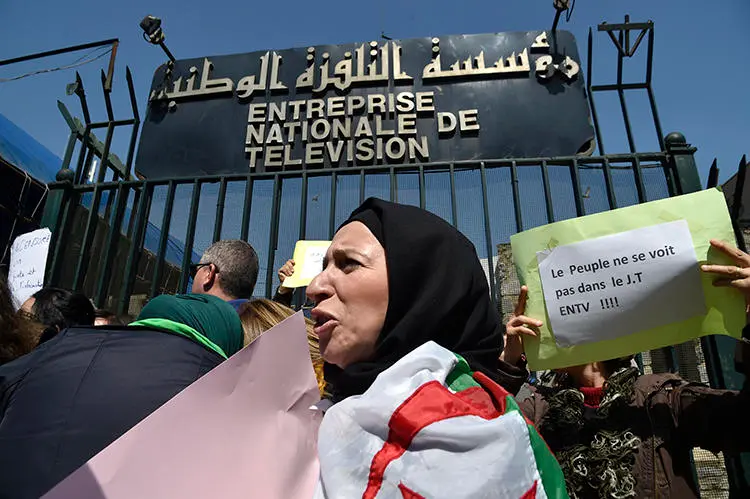In April and May 2019, Algeria’s Public Establishment of Television, the state broadcaster, suspended at least two television journalists who sought to cover protests in the country, according to journalists who spoke to CPJ and news reports.
Journalists in Algeria have staged sit-ins and publicly railed against the perceived censorship and bias in their outlets’ coverage since February, according to CPJ reporting.
On April 10, Melina Yacef, who presents the show “Towards the Path of Change” on state television channel Algerie 5, requested a meeting with Lotfi Cheriet, then the president of the Public Establishment of Television, after noticing that her show did not air that day, the journalist told CPJ over the phone.
On April 11, Cheriet told Yacef that he received orders not to allow Yacef to record new episodes until further notice, Yacef told CPJ, saying that Cheriet did not disclose the origin of the orders or reason for the suspension.
Yacef had recently petitioned the Public Establishment of Television to give reporters more freedom to cover the protests in the country, and had participated in the ongoing sit-ins by Algerian state television journalists, she told CPJ. When Yacef started collecting signatures for a petition to improve the state broadcaster’s coverage of the protests, she received an anonymous phone call asking her to stop, and to stay away from the journalists’ sit-ins, Yacef told CPJ. She continued with her activism nonetheless, which she told CPJ she believes is what prompted her suspension.
On April 24, Algerie 5 began broadcasting reruns of Yacef’s show, she told CPJ. As of June 12, she has not received any notice of when she will be allowed to broadcast again, Yacef told CPJ.
On May 3, Abdelrazzak Siah, a news anchor at state television channel Algerie 3, was suspended from his position after he called for greater press freedom during an interview with a privately owned TV channel, according to Siah, who spoke with CPJ over the phone, and news reports.
Siah appeared in a Facebook live interview by privately owned Algerian channel Berber TV on April 28, where he called on state television to cover the country’s ongoing protests and said that, prior to President Abdelaziz Bouteflika’s resignation on April 2, “state television was not representing the state, it was representing corruption.”
On May 3, Cheriet informed Siah that he was suspended until further notice, citing the journalist’s statements against state television, Siah told CPJ. As of June 12, Siah had not received any updates regarding his suspension, he said.
Bouteflika appointed Cheriet, a political ally, to head the broadcaster on March 25, according to Siah and a report by Reuters. Under Bouteflika, the presidency had a strong influence over the content aired by the broadcaster, Siah told CPJ.
After Bouteflika stepped down, Abdelkader Bensalah took office as the country’s acting president, according to local news reports. On May 25, Bensalah removed Cheriet from his role and appointed journalist Salim Rabahi as president of the broadcaster, according to those reports.
Under Bensalah, the Algerian military has increased its power over public establishments, including the state broadcaster, according to Rabha Attaf, a freelance reporter and author who covers the region, and other journalists who spoke with CPJ but requested anonymity for fear of reprisal.
Cheriet declined to be interviewed directly. CPJ reached out to a friend and former colleague of Cheriet’s, who asked the former broadcast president for comment on the suspensions. Through the friend, Cheriet denied suspending any journalist, and said that Siah’s removal was part of a routine newsroom restructuring. He declined to comment specifically on Yacef’s case.
The Public Establishment of Television did not respond to CPJ’s requests for comment via phone and email.
